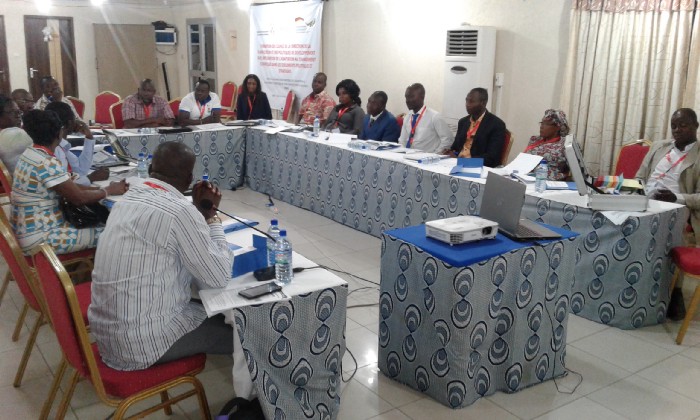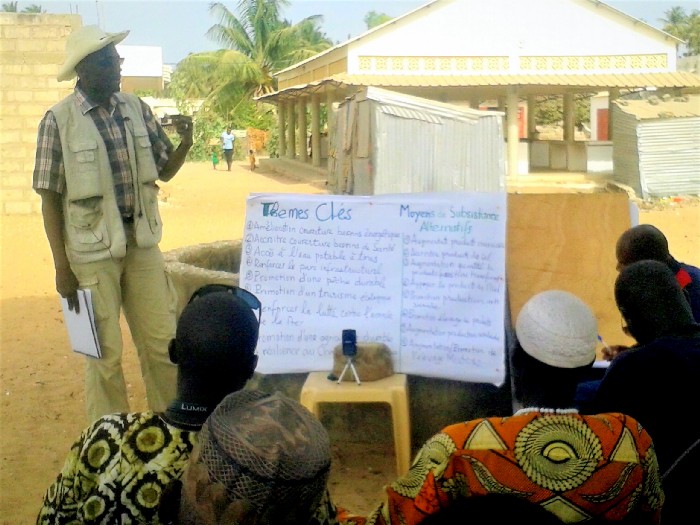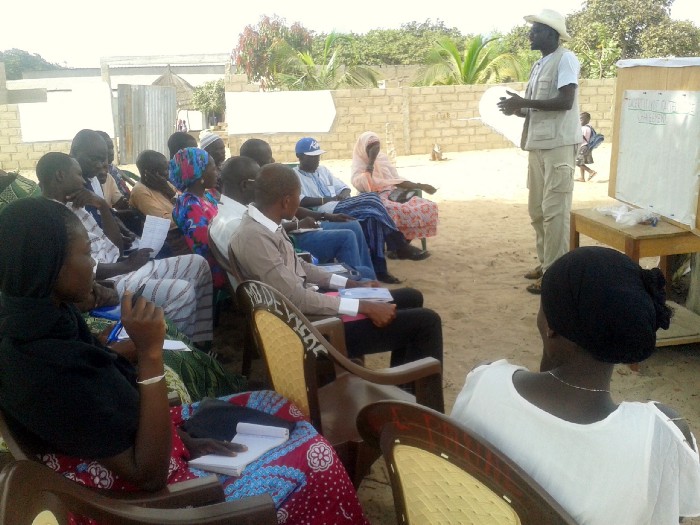Developing countries are more likely to be exposed to the negative effects of climate change. Extreme weather events such as droughts, heatwaves, and heavy precipitation present new risks to development work. How then, can people and societies adapt to new human-induced environmental changes?
To facilitate climate change adaptation planning, the United Nations Framework Convention on Climate Change (UNFCCC) established the National Adaptation Plan (NAP) process as part of a global effort to help the most vulnerable countries to design, coordinate, implement and monitor their efforts in managing climate risks.

NAP Training pm Executives of ministry of planning. Togo, 2015
The National Adaptation Global Support Programme (NAP-GSP), provides a global support mechanism to enable countries to identify, finance and implement appropriate medium to long-term adaptation actions at national, sub-national and local levels. It is financed by the Special Climate Change Fund (SCCF) and the Least Developed Countries Fund (LDCF) of the Global Environment Facility (GEF). The programme implemented by UNDP and UN Environment, in collaboration with other UN agencies, assists developing countries to advance their national adaptation plans (NAP) processes. The programme provides Least Developed Countries(LDCs) and other non-LDC developing countries with technical and organizational support to advance their NAPs.
NAP-GSP works in three areas: 1) institutional support, 2) technical support, and 3) knowledge brokering. As the principal training of the United Nations, UNITAR is a NAP-GSP partner that provides training and skills assessment services.
Training individuals to advance the NAPs
In the context of supporting countries through training, UN CC:Learn/UNITAR delivers Training of Trainers (TOT), regional and country-level trainings, to equip national policymakers with the skills needed to tackle long-term vulnerability to climate change and examine adaptation options through training workshops. These trainings are aimed at operationalizing tools (such as the LEG NAP Technical Guidelines) developed to assist countries in their NAP journeys. The trainings have been designed to enhance understanding of NAP processes and to provide tools to advance these at the country level.
In the spring of 2015, Aliou Gory Diouf, a Senegalese Geographer and Senior Programme Officer in the Climate Change Vulnerability Adaptation Resilience department of EDNA Énergie, participated in the NAP Training of Trainers workshop in Bangkok.
From learning to manage time better to structuring learning modules in a more efficient way, Aliou admits that he’s also been able to strengthen his network. Since the workshop, Aliou has been invited to lead or co-lead training in Togo (twice), in Benin, in Tunisia and in Senegal.
We interviewed Aliou, and this is his experience participating in a Training of Trainers from UN CC:Learn/UNITAR. I hope they respond to your expectations.

Aliou was training local policymakers, CSOs, women and youth on methods and tools of climate change vulnerability assessment and adaptation planning. At Niodior Island, Senegal, 2014.
Which specific skills did the NAP Training of Trainers help you to strengthen?
AGD: Time management and workshop facilitation were extremely helpful for me. In Togo, for example, I had to run training for Executives of the Ministry of Planning for 4 days. I was in charge of preparing all the training materials, exercises, and logistics. Managing these activities, while also facilitating the training at the same time was a good test for me to practice and improve my time management skills.
How did the NAP Training of Trainers, as well as the NAP training delivery impact you as an individual?
AGD: The main impact, and subsequent training, is that I have organized and delivered training in other countries. This has helped my confidence and has given me the ability to master the NAP process of mainstreaming climate change adaptation into planning. Second, I now have a clear understanding and vision of how the NAP process can help countries fight climate change impacts.
I am recognized as a NAP Trainer and have helped mainstream NAP policies and strategies in the fishery sector to help fund some adaptation actions by the Government and encourage donors to support the implementation of the policies in Senegal.

Community Training on climate change vulnerability and adaptation planning. At Niodior Island, Senegal, 2014.
How did the NAP Training of Trainers lead to an impact on your affiliate institution ENDA Énergie?
AGD: ENDA Énergie is benefiting from the NAP Training of Trainers through me as a NAP trainer working for them. In countries where I have conducted training, I am known as someone working at ENDA Énergie and this makes their visibility higher.
In your opinion, how could the NAP-GSP network enhance the potentiality of NAP trainings to generate positive outcomes at the individual and/or institutional level?
AGD: I think the NAP-GSP network could be known more if it engaged more trainers in Africa. I do not know of other trainers (I may be wrong), but my feeling is that the NAP-GSP network is a matter of some UN Agencies and bilateral institutions, where stakeholders in Africa are not very present. Perhaps, this is partly due to the fact that the engagement of trainers is not done with institutions but directly with individuals.
Organizing webinars would also be helpful, especially for recent trainers to come together and share their thoughts with other NAP-GSP members.
—
Prior to participating in the NAP Training of Trainers, Aliou was already conducting training on issues related to the NAP process. However, the training “added a great value” to his skills. For Aliou, two major takeaways from participating in the Training of Trainers are:
- The NAP process is crucial for developing countries, much more than he had been taught;
- There is a need for more time, resources, and activities than what is currently being mobilized to anchor climate change adaptation in structures, practices and the system.
The strong link that needs to be built between the NAP process and NAP implementation is still missing. Against climate change, it’s crucial to plan but it’s also vital to implement,” he conclude
Aliou is now the Head of the climate finance department at Africa Sustainability Center (ASCENT), a pan-African Project/Programme incubator for climate finance.
